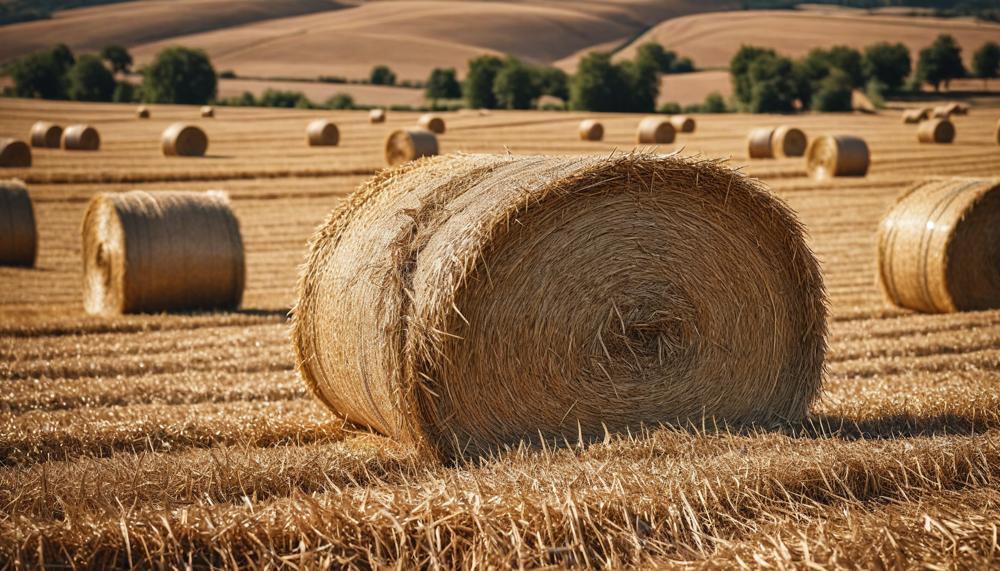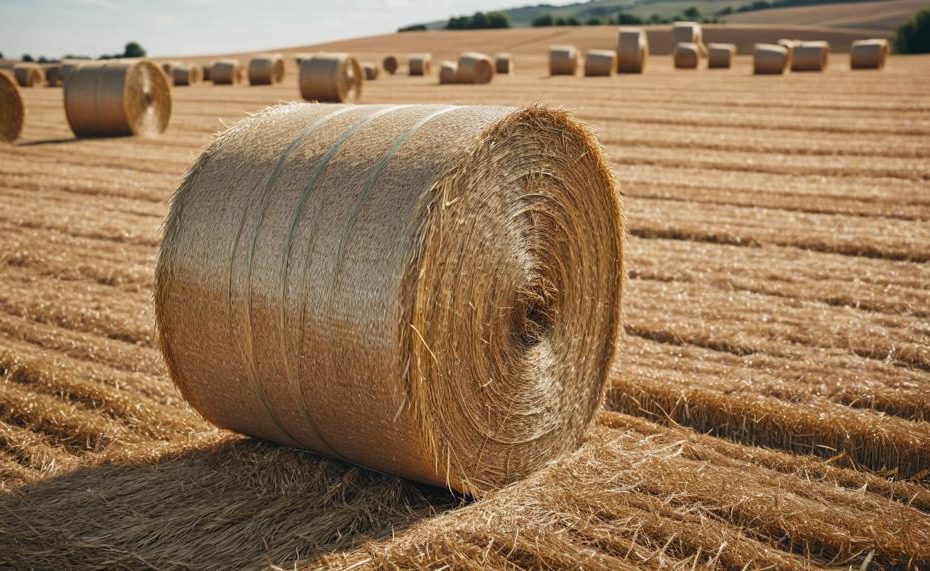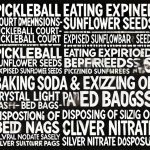Disposing of straw bales might seem straightforward, but doing it correctly can make a significant difference for your garden, wallet, and the environment. Whether you’re clearing out after a festive season or just tidying up, here’s how to manage those bales in the best way possible.
First off, don’t just toss them out. Dry, clean, and intact straw bales are incredibly versatile. They can be reused for various purposes like holiday decorations, mulch for your garden, or even as animal feed. If you no longer need them, consider giving them away. Many community members or local farms would gladly take them off your hands, and social media platforms make it easy to find interested parties.
If reusing or giving away isn’t an option, check with your local waste management service. They often pick up yard waste, including straw bales. For larger bales, break them down into manageable chunks and bag them for collection. Alternatively, schedule a special large debris pickup for convenience.
For the eco-conscious, composting is a fantastic way to repurpose straw bales. They break down well and enrich your compost pile, providing valuable nutrients for your garden. Proper storage can also extend the life of straw bales for several years, saving you money and reducing waste.
Key Takeaways:
- Reuse and Give Away: Dry and intact bales can be used as decorations, mulch, or animal feed, or given to others.
- Local Waste Management: Utilize yard waste services, break down large bales, or schedule a special pickup.
- Composting: Straw bales are excellent for composting and can enrich your garden soil.
- Storage: Properly stored straw bales last longer and can save money over time.
By taking these steps, you can ensure your straw bales are disposed of responsibly, benefiting both you and the environment.
Contents
What Condition are the Straw Bales?
The condition of straw bales can be determined by examining several key factors. Here’s a detailed guide to help you assess their usability:
| Condition | Indicator | Action |
| Dryness | Feels dry to the touch, no dampness | Can be reused |
| Cleanliness | No debris, dirt, or foreign materials | Can be reused |
| Structural Integrity | Maintains shape, not falling apart | Can be reused |
| Signs of Mold/Plant Growth | Mold, mushrooms, other plants growing | Dispose |
| Insect Infestation | Presence of ants or other insects | Dispose |
Waste Collection Services
Waste collection services offer several solutions for the proper disposal of straw bales, ensuring an efficient and environmentally friendly process. Here’s how they can assist:
- Regular Yard Waste Pick-Up: Local waste management services typically include yard waste pick-up as part of their routine services. By breaking down large straw bales into smaller, manageable chunks and bagging them, you can place these bags out for regular collection.
- Special Large Debris Pick-Up: If you have a significant amount of straw bales or larger pieces that are difficult to break down, scheduling a special large debris pick-up is a viable option. This service might incur additional costs but offers convenience and ensures proper handling.
- Composting Options: Instead of disposal, consider using old straw bales to start a composting area. Straw bales create an excellent base for compost piles, providing structure and aeration. This method not only recycles the straw but also enriches your garden soil over time.
- Direct Drop-Off: For those who prefer a hands-on approach and have the means to transport the bales, directly dropping off the straw bales at a local composting facility or waste disposal site can be more economical.
Dispose of Straw Bales Yourself
To dispose of straw bales yourself, follow these steps:
| Step | Action | Notes |
| 1 | Assess Condition | Dry, clean, and intact bales can be reused or donated. |
| 2 | Contact Local Waste Management | Check if they offer yard waste pick-up services. |
| 3 | Break Down Bales | Bag smaller chunks for easier disposal if bales are too large. |
| 4 | Schedule Special Pick-Up | Arrange with waste management for multiple bales. |
| 5 | Composting/Mulching | Use straw for garden compost or mulch. |
| 6 | Proper Storage | Store in a dry, covered area for extended usability. |
Donate/Sell Usable Bales
Straw bales offer numerous opportunities for repurposing or selling, transforming them from waste into valuable resources. Here’s how you can give your straw bales a second life:

- Gardening and Landscaping: Straw bales can be repurposed as garden beds, creating an ideal growing medium for vegetables and flowers. Even if partially decomposed, they enhance soil structure and retain moisture, making them perfect for plant growth. If the bales are intact, enrich them with nitrogen-rich fertilizers or aged compost to boost their fertility and longevity. More information on using straw bales in gardening can be found here.
- Animal Bedding: Clean, dry straw bales are excellent for animal bedding. Farmers and pet owners alike often seek straw for its absorbency and insulation properties. By selling bales locally or through online marketplaces like Craigslist, you can cater to this demand.
- Mulching and Composting: Decomposing straw bales are invaluable for mulching or composting. They suppress weeds, retain soil moisture, and eventually break down to enrich the soil. These bales can be advertised to local gardeners or community gardens looking for sustainable mulch or compost material.
- Construction Material: Straw bales are an eco-friendly building material used in straw bale construction for creating insulation and walls. This market can be lucrative if you connect with green builders or eco-conscious homeowners. Learn more about straw bale construction here.
- Art and Decor: Straw bales are popular in fall festivals, weddings, and rustic decorations. You can sell them to event planners or directly to individuals looking for a natural aesthetic for their events.
- Erosion Control: Straw bales are effective in controlling soil erosion on slopes or construction sites. Selling to construction companies or municipalities can turn your surplus bales into a profit.
Repurposing or selling straw bales not only reduces waste but also contributes to sustainability and offers potential financial returns.
Consider Fake Bales
Disposing of straw bales can be handled through several innovative and practical methods, including using fake bales. Here’s a detailed comparison of alternative disposal options and their advantages over traditional methods.
Alternative Disposal Options for Straw Bales
- Repurposing
- Usage: Garden mulch, animal bedding, erosion control, construction material, art, and décor.
- Advantages: Sustainable, potential profit, reduces waste.
- Drawbacks: Requires time and effort to repurpose.
- Community Reuse
- Usage: Donate or sell to local gardeners, farmers, or artists.
- Advantages: Supports local community, promotes reuse.
- Drawbacks: Dependent on local demand.
- Composting
- Usage: Turn old straw into compost.
- Advantages: Enriches soil, environmentally friendly.
- Drawbacks: Time-consuming, requires composting space.
- Decorative Use
- Usage: Seasonal decorations, event settings.
- Advantages: Aesthetic appeal, versatile.
- Drawbacks: Limited to dry, clean bales.
- Local Waste Management
- Usage: Regular yard waste collection.
- Advantages: Convenient, regular service.
- Drawbacks: May incur a cost, depends on local policies.
Using Fake Bales
- Usage: Primarily for decorations.
- Advantages:
- Durability: Long-lasting, can be reused for multiple events.
- Convenience: No need for disposal, easy to store.
- Safety: Avoids potential allergens or pests found in real straw.
- Drawbacks:
- Cost: Higher initial investment compared to real straw.
- Aesthetic: May not have the same natural look as real straw.
Comparative Analysis
| Option | Advantages | Drawbacks |
| Repurposing | Sustainable, profit potential, reduces waste | Time-consuming, effort needed |
| Community Reuse | Supports local community, promotes reuse | Dependent on local demand |
| Composting | Enriches soil, environmentally friendly | Time-consuming, space needed |
| Decorative Use | Aesthetic appeal, versatile | Limited to dry, clean bales |
| Local Waste Management | Convenient, regular service | May incur a cost, policy-dependent |
| Fake Bales | Durable, reusable, convenient, safe | Higher initial cost, less natural look |
Each option presents unique benefits and challenges. Repurposing and community reuse emphasize sustainability and local support, whereas composting and local waste management offer straightforward disposal solutions.
Fake bales, while more costly upfront, provide convenience and long-term reusability, making them a practical alternative for decorative purposes without the disposal hassle.
Reuse/Recycle Straw Bales Yourself
There are numerous inventive ways to reuse or recycle straw bales rather than simply disposing of them. These methods not only promote sustainability but also offer practical and creative benefits.
Gardening Enhancements
Straw bales can serve as an excellent medium for gardening. Use them to create raised beds, which help improve soil drainage and aeration. Simply place the bales in your desired layout, condition them with water and fertilizer, and plant directly into them.
Composting
Straw bales break down over time and can be a valuable addition to your compost pile. Their high carbon content complements nitrogen-rich materials, balancing the compost mix and speeding up the decomposition process.
Animal Bedding
Straw is ideal for animal bedding due to its absorbent nature and softness. It’s particularly useful for livestock like chickens, rabbits, and horses.
This reuse helps keep animals comfortable and dry, reducing the need for frequent cleanings.
Erosion Control
Place straw bales on slopes or in areas prone to erosion. They help slow down water runoff, preventing soil erosion and aiding in sediment retention.
This is especially useful in construction sites or newly planted gardens.
Insulation
Straw bales offer natural insulation for various projects. Use them to insulate garden sheds, animal shelters, or even outdoor compost bins.
Their insulating properties help maintain consistent temperatures.
Holiday Decorations
Straw bales can be used creatively for holiday decorations. They make a charming base for autumn displays, Halloween setups, or even Christmas nativity scenes.
After the festivities, they can be composted or reused in the garden.
Mulching
Shredded straw bales make excellent mulch. Spread the shredded straw around plants and trees to retain moisture, suppress weeds, and improve soil quality as they decompose.
Community Sharing
If you have excess straw bales, consider giving them to others in your community.
Gardeners, farmers, or even schools might have a need for straw bales. This not only helps reduce waste but also fosters community spirit.
Craft Projects
Get creative with straw bales in craft projects. They can be used to construct scarecrows, straw dolls, or even eco-friendly furniture. The possibilities are limited only by your imagination.
Most Popular Articles
The top techniques for disposing of straw bales in an environmentally friendly manner include composting, repurposing in garden projects, using local recycling centers, and ensuring proper inspection before disposal.
| Technique | Description | Benefits |
| Composting | Straw bales can be added to compost piles, where they break down into valuable organic matter. | Creates nutrient-rich compost for gardens, reduces waste, and supports soil health. |
| Shredding or Chopping | Shredding or chopping the bales increases the surface area, accelerating the composting process. | Speeds up decomposition, making compost available sooner. |
| Repurposing in Gardens | Straw bales can be used as mulch, garden beds, or erosion control in landscaping projects. | Provides natural mulch, reduces soil erosion, and improves water retention. |
| Recycling Centers | Local recycling or waste management centers may have specific guidelines for straw bale disposal. | Ensures environmentally responsible disposal and adheres to local regulations. |
| Inspection | Inspecting for mold, pests, or contaminants ensures safe disposal or repurposing. | Prevents spreading of harmful substances and maintains healthy garden environments. |
Composting straw bales not only helps reduce landfill waste but also enriches soil, benefiting gardens and landscapes. Shredding the bales can expedite this process, making composting more efficient.
Repurposing straw bales in gardening projects adds value by controlling erosion and improving soil structure.
Conclusion
Disposing of straw bales requires a thoughtful approach to maximize their potential and minimize environmental impact. Instead of simply discarding them, consider the many ways they can be reused or responsibly disposed of.
Dry, clean, and intact straw bales are versatile assets. They can serve as holiday decorations, garden mulch, or animal feed. If you no longer need them, give them away to community members or local farms. Social media platforms make it easy to connect with those who could benefit from them.
If reusing or giving away isn’t feasible, local waste management services can help. They often collect yard waste, including straw bales. For large bales, break them down into smaller pieces and bag them for easier collection. Alternatively, schedule a special pickup for larger quantities.
For an eco-friendly option, composting is an excellent choice. Straw bales decompose well and add valuable nutrients to compost piles, enriching your garden soil. Proper storage can extend the life of straw bales for years, saving money and reducing waste.
By repurposing, donating, composting, or utilizing local waste services, you can dispose of straw bales responsibly.





